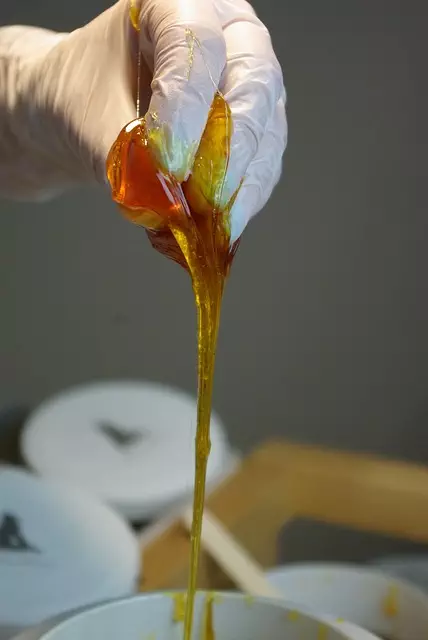Carpet odors result from various causes like spills, mold, pet accidents, and substances like cooking fumes or dust mites. Effective odor removal involves understanding these sources, promptly addressing leaks and spills, regular cleaning, proper ventilation, and using specialized products. Modern techniques use enzymatic cleaners, absorbent materials, and equipment like steam vacuums or ozone generators to break down odor compounds. Natural methods include baking soda, essential oils, and white vinegar. Steam cleaning penetrates fibers to eliminate bacteria, fungi, and allergens. Persistent odors from pet accidents or mold require professional intervention with specialized equipment and expertise. Regular vacuuming with a HEPA filter and prompt stain treatment are key to maintaining fresh carpets. Air fresheners mask smells temporarily; effective removal requires identifying and addressing the root cause through tailored professional cleaning.
Carpet odor can be both frustrating and embarrassing, but effective solutions exist to freshen and purify your living space. This comprehensive guide explores various methods for tackling carpet odors, from understanding common causes to employing powerful cleaning techniques. Discover natural remedies, chemical treatments, and modern methods like steam cleaning. Learn when professional help is necessary and gain tips for maintaining a fresh carpet environment. Take control of your home’s aroma with these expert insights on odor removal.
Understanding Carpet Odor: Common Causes and Triggers

Carpet odors can be a nuisance, stemming from various sources and triggers. Understanding these causes is the first step in effective odor removal. Common culprits include spills and leaks, which can lead to mold and mildew growth if not promptly addressed. Pet accidents, both from furry friends and even pets like birds, can also result in strong smells. Regular foot traffic, especially in high-traffic areas, compacts the carpet fibers, trapping moisture, dirt, and sweat, contributing to unpleasant odors.
Additionally, certain substances like cooking fumes, cleaning products, air pollutants, and even dust mites can embed themselves in the carpet fibers, causing persistent smells. Identifying these sources is crucial for successful odor removal. Proper ventilation, regular cleaning, and using specialized products designed for deep carpet freshening are effective strategies to combat these issues.
The Science Behind Odor Removal Techniques

Odor removal is a science that involves understanding how scents are created and absorbed. The human nose is incredibly sensitive, capable of detecting even trace amounts of certain compounds known as odorants. These odorants can be produced by various sources such as sweat, food, pets, or environmental factors like mildew. When they come into contact with fibers in your carpet, they become trapped, leading to persistent odors.
Modern odor removal techniques leverage this knowledge through the use of specialized chemicals and technologies. Enzymatic cleaners, for instance, employ enzymes that break down specific odor-causing molecules. Absorbent materials can also be used to draw out moisture and volatile organic compounds (VOCs) responsible for smells. In addition, advanced equipment like steam vacuums or ozone generators help eliminate odors by sanitizing and deodorizing carpets without harsh chemicals.
Natural Solutions for Freshening Your Carpets

Freshen your carpets naturally with ingredients found around your home. Baking soda is a popular choice for its ability to absorb odors, so sprinkle it over your carpet and let it sit for an hour before vacuuming. Alternatively, try essential oils like lemon or lavender; add a few drops to a spray bottle filled with water, then lightly mist the carpet. This not only eliminates odors but also adds a fresh, natural scent.
Another effective method is using white vinegar. Mix equal parts vinegar and warm water, then use a clean cloth to apply the solution to the carpet. Vinegar’s acidity helps break down odor-causing substances. After allowing it to dry, vacuum as usual. These simple, eco-friendly solutions offer an excellent alternative to commercial products for effective odor removal.
Effective Chemical Treatments for Odor Elimination

Carpet odor removal often requires a deeper approach than simple vacuuming. Effective chemical treatments are designed to neutralise and eliminate stubborn odors embedded in the carpet fibers. These solutions typically include powerful odour absorbers that target organic compounds responsible for unpleasant smells.
Commonly used chemicals include enzymes, which break down odor-causing substances, and ammonia-based products, known for their effectiveness in neutralising a wide range of odors. Professional carpet cleaning services often employ these treatments, combining them with specialised equipment to ensure thorough penetration and maximum odour removal, leaving your carpets fresh and clean.
Steam Cleaning: A Powerful Method for Deep Cleaning and Odor Removal

Steam cleaning is a powerful method for deep cleaning and odor removal, particularly effective for carpets. This process involves using high-pressure steam to penetrate deep into carpet fibers, lifting dirt, grime, and odors trapped within. The intense heat of the steam helps to break down and eliminate bacteria, fungi, and other microorganisms that contribute to persistent smells.
By infusing hot steam into carpets, this method not only freshens the fabric but also kills allergens and reduces the need for harsh chemicals. It’s a popular choice among homeowners seeking an eco-friendly and thorough cleaning solution, especially for tackling stubborn pet odors or smoke-related residues.
When to Seek Professional Help for Severe Odor Issues

Carpets can sometimes harbor intense, stubborn odors that home remedies might not be able to effectively address. If your carpet has a persistent smell—from pet accidents, mold growth, or unknown sources—it’s time to consider professional help. Professional carpet cleaning services are equipped with specialized equipment and products designed for severe odor removal. They have the expertise to identify and treat the root cause of the issue, ensuring that not only is the visible stain or smell eliminated but also any underlying problems that could lead to future odors.
Seeking professional assistance is particularly crucial when dealing with health-related concerns or extreme cases of carpet damage. For instance, if there’s evidence of mold growth due to water damage or excessive moisture, a professional service will employ advanced techniques and products to safely and thoroughly clean the affected areas, preventing further health risks and ensuring your home environment remains safe and odor-free.
Maintaining a Fresh Carpet: Regular Care Tips

Maintaining a fresh carpet involves regular care to prevent odor buildup. One of the most effective ways to keep your carpet smelling clean is through frequent vacuuming. This helps remove dust, dirt, and other debris that can contribute to unpleasant odors. Using a vacuum with a HEPA filter can further enhance air quality by trapping small particles and allergens.
In addition to vacuuming, cleaning your carpets with a suitable detergent or stain remover on a regular basis is crucial for odor removal. Targeting problem areas promptly prevents odors from becoming ingrained in the fibers. For stubborn smells, consider using natural deodorizers like baking soda or essential oils, which can absorb and neutralize odors without harsh chemicals. Regular cleaning not only maintains the carpet’s appearance but also ensures a fresh and healthy indoor environment.
Common Misconceptions About Carpet Odor and How to Bust Them

Many people hold onto several misconceptions about carpet odors, which can lead to ineffective cleaning methods. One common belief is that carpet odor is solely caused by lack of vacuuming, but in reality, it’s often a sign of deeper issues. Dust, pet dander, and other allergens can get trapped within the fibers, leading to persistent smells, despite regular vacuuming.
Another misconception is that air fresheners mask odors instead of removing them. While they can provide a temporary solution, these products often contain chemicals that might not be safe for indoor environments. The best approach to carpet odor removal involves identifying and addressing the root cause—whether it’s a spill, pet accidents, or accumulated dust—through professional cleaning techniques tailored to different carpet types.
